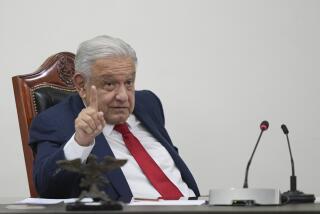Cuba Tape Casts a Shadow Over Fox’s Domestic Agenda
MEXICO CITY — President Vicente Fox will face even greater problems pushing his stalled domestic agenda through an opposition-dominated Congress after an embarrassing clash between his government and Cuba, analysts said Tuesday.
Cuba’s release Monday of a taped telephone conversation between Fox and President Fidel Castro shows that the Mexican leader applied pressure on his Cuban counterpart to depart early from a summit last month in Mexico to avoid a potentially awkward encounter between the Communist leader and President Bush.
The tape, roundly criticized as an underhanded ploy by Castro, nevertheless reveals that Fox was less than candid in his earlier statements to the Mexican public that Castro had left early of his own free will.
The tape also suggests that Fox was accommodating the American president at Castro’s expense, which rankled critics of the Mexican leader’s pro-U.S. policies. Fox has achieved little in terms of the concessions he has sought from the Bush administration on issues such as immigration and cross-border infrastructure, the critics say.
The tape will put Fox’s ambitious legislative agenda in even deeper jeopardy than it was, facing as he does a divided and increasingly hostile Congress dominated by the traditionally pro-Cuba Institutional Revolutionary Party, or PRI. Fox’s reform efforts last year largely fell flat, and the tape incident will make bending Congress to his will even tougher this year, observers said.
“This is another irritant in the relationship between Fox and the PRI, which makes the PRI less disposed to pass reforms they don’t want to pass anyway,” said Pamela K. Starr, professor of political science at the Autonomous Technological Institute of Mexico.
Fox is locked in a power struggle with the PRI, the long-ruling party that he dislodged from the presidency in 2000. Fox and Congress have been fighting for powers that previously were held by the PRI, Starr said.
Pressure has been mounting on Fox--both domestically and internationally--to do something on the reforms he promised as a candidate. But his efforts have been frustrated in Congress, where his National Action Party is in the minority.
At issue could be billions of dollars of foreign investment that hinge on reforms to Mexico’s inefficient infrastructure and corruption-prone judicial system. Only last month, Fox got an earful from U.S. auto industry executives who warned that he might see investment leave Mexico unless changes were made.
“As for external damage to Mexico, there isn’t any, even if there is a break in relations with Cuba,” said Jose Antonio Crespo, political analyst at the Center for Economic Research and Teaching here. “But internally, yes--for the paralysis this will generate for Fox’s initiatives, the difficulties he will have in advancing them.”
Mexico’s changing policy toward Cuba has been a tinderbox. As Fox has distanced himself from Castro, the PRI and the left-leaning Democratic Revolution Party, or PRD, have criticized him bitterly, maintaining that the nation’s relationship with Cuba is essential to maintaining Mexico’s independence from U.S. foreign policy.
Castro was outraged by Mexico’s decision Friday to vote in favor of a United Nations measure calling on Cuba to allow human rights inspections. The vote showed Mexico’s sea change of attitude under Fox: In past years, Mexico had abstained from votes critical of Cuba’s human rights record.
Now the PRI has even more ammunition with which to fight the Mexican president’s proposals. Though Fox argues that such reforms would boost the economy, opponents say they would surrender state-owned resources and services to U.S. corporate control.
“Fox has to dispel the notion that he lied,” said Denise Dresser, a senior fellow at USC’s Pacific Council on International Policy. “The opposition is having a field day with this. It underscores what they have been saying all along, which is that Mexico has submitted itself to U.S. wishes.”
Opposing legislators, including Sen. Silvia Hernandez of the PRI, took off the gloves Tuesday. She called on Fox from the floor of Congress’ upper chamber to “return to the path of truth and respect for the principles that have brought us stability as a nation.”
The PRD party president, Rosario Robles, also slammed the nation’s leader, declaring: “President Fox lied to Mexicans. If he lied to his country on a theme as important as foreign policy, what is happening in other areas?”
Fox spokeswoman Alicia Buenrostro responded that “keeping silence on something which has been previously agreed to as private is not lying. It is honoring a commitment of privacy. Fox spoke to a friend, and Castro spoke to a tape recorder.”
The tape is the latest and ugliest turn of events in the Cuba-Mexico melodrama, which has been ongoing since Castro abruptly left the U.N. development summit in Monterrey in a huff last month.
Mexican Foreign Minister Jorge Castaneda told a radio reporter Tuesday that his nation had no plans to cut diplomatic relations or recall its ambassador.
In a nearly four-hour discourse Tuesday night, Castro railed against the Fox administration for its policies.
More to Read
Sign up for Essential California
The most important California stories and recommendations in your inbox every morning.
You may occasionally receive promotional content from the Los Angeles Times.










